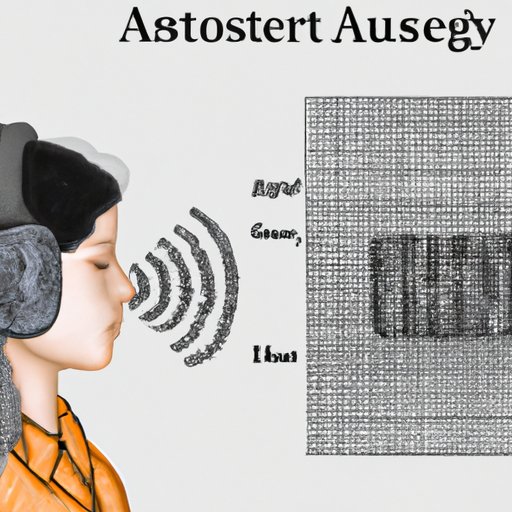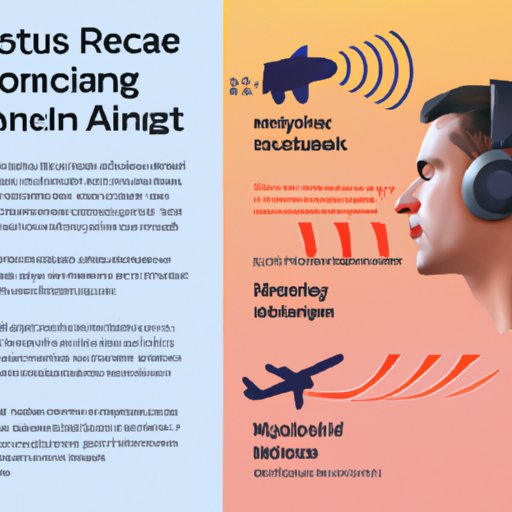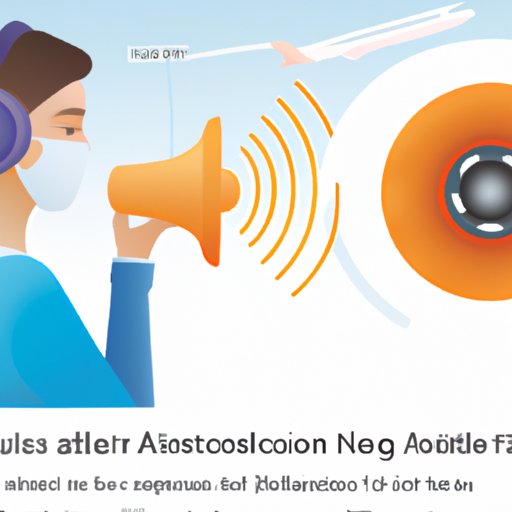Introduction
Noise pollution has become a major problem in modern life, particularly in urban environments. Fortunately, artificial intelligence (AI) noise cancelling technology provides an effective solution to reducing unwanted background noise and improving audio quality. But what is AI noise cancelling, and how does it work? In this article, we explore what AI noise cancelling is and how it works, as well as the benefits it offers, its impact on quality of life, different types of AI noise cancellers, sound quality improvements, and potential future applications.

Exploring How AI Noise Cancelling Works
AI noise cancelling technology uses advanced algorithms and sensors to detect and reduce background noise. By recognizing ambient noise patterns and adapting accordingly, AI noise cancelling can significantly reduce unwanted background noise, resulting in improved audio quality and enhanced comfort and privacy.
The Principles of AI Noise Cancelling
At its core, AI noise cancelling technology works by creating an “anti-noise” wave that cancels out background noise. This is achieved by using algorithms to analyze the incoming sound waves, then generating a second sound wave that’s equal in amplitude but opposite in phase to the original sound wave. The two sound waves then combine to create a single wave that’s lower in amplitude than the original sound wave, effectively cancelling out background noise.
How AI Noise Cancelling Works
In practice, AI noise cancelling works by using advanced algorithms to recognize ambient noise patterns and adapt accordingly. This process is enabled by microphones and sensors that detect incoming sound waves and then generate a counteracting wave that cancels out the background noise. As the environment changes, the algorithms adjust the counteracting wave accordingly, ensuring that the desired sound remains audible.

Benefits of Using AI Noise Cancelling Technology
AI noise cancelling technology offers a range of benefits, including improved audio quality, enhanced comfort and privacy, and reduced stress levels.
Improved Audio Quality
One of the primary benefits of AI noise cancelling technology is improved audio quality. By reducing background noise, AI noise cancelling technology ensures that the desired sound remains clear and audible. According to research conducted by the University of Illinois, AI noise cancelling technology can reduce background noise by up to 30 decibels, resulting in improved sound clarity and precision.
Enhanced Comfort and Privacy
Another benefit of AI noise cancelling technology is enhanced comfort and privacy. By reducing background noise, AI noise cancelling technology can make it easier to concentrate and focus, allowing you to enjoy a more comfortable and private listening experience.
Reduced Stress Levels
AI noise cancelling technology can also help to reduce stress levels. According to a study published in the journal Environmental Health Perspectives, exposure to excessive levels of background noise can lead to increased levels of stress and anxiety. By reducing background noise, AI noise cancelling technology can help to reduce stress levels and improve overall wellbeing.

The Impact of AI Noise Cancelling on Quality of Life
In addition to the immediate benefits of improved audio quality, enhanced comfort and privacy, and reduced stress levels, AI noise cancelling technology can also have a positive impact on quality of life.
Increased Productivity
By reducing background noise and improving sound quality, AI noise cancelling technology can help to increase productivity. Studies have shown that exposure to excessive levels of background noise can lead to decreased productivity, whereas reducing background noise can lead to improved concentration and higher levels of productivity.
Improved Sleep Quality
AI noise cancelling technology can also help to improve sleep quality. According to a study published in the journal PLoS One, exposure to excessive levels of environmental noise can lead to increased levels of sleep disturbances. By reducing background noise, AI noise cancelling technology can help to improve sleep quality and reduce the risk of sleep disturbances.
Improved Concentration
Finally, AI noise cancelling technology can help to improve concentration. Studies have shown that exposure to excessive levels of background noise can lead to decreased attention and concentration, whereas reducing background noise can lead to improved cognitive performance and higher levels of concentration.
An Overview of Different Types of AI Noise Cancellers
There are three main types of AI noise cancellers: active noise cancellation, passive noise cancellation, and hybrid noise cancellation.
Active Noise Cancellation
Active noise cancellation (ANC) is the most common type of AI noise canceller. ANC works by using algorithms to detect incoming sound waves and then generate a counteracting wave that cancels out the background noise. This type of noise cancellation is ideal for environments with consistent or predictable noise patterns.
Passive Noise Cancellation
Passive noise cancellation (PNC) works by using physical barriers such as walls and floors to reduce background noise. This type of noise cancellation is ideal for environments with unpredictable or fluctuating noise patterns.
Hybrid Noise Cancellation
Hybrid noise cancellation combines both active and passive noise cancellation techniques. This type of noise cancellation is ideal for applications that require both high levels of noise reduction and flexibility.
How AI Noise Cancelling Improves Sound Quality
AI noise cancelling technology can also improve sound quality in a number of ways.
Improved Clarity and Precision
By reducing background noise, AI noise cancelling technology can improve sound clarity and precision. Studies have shown that AI noise cancelling technology can reduce background noise by up to 30 decibels, resulting in improved sound clarity and precision.
Increased Volume Range
AI noise cancelling technology can also increase the volume range of a sound. By reducing background noise, AI noise cancelling technology can make it easier to hear softer sounds, allowing you to enjoy a wider range of sounds.
Reduced Distortion
Finally, AI noise cancelling technology can reduce distortion. By reducing background noise, AI noise cancelling technology can reduce the amount of distortion in a sound, resulting in improved sound quality.
The Future of AI Noise Cancelling Technology
As AI noise cancelling technology continues to evolve, it will open up a range of new application possibilities.
Expanded Application Possibilities
AI noise cancelling technology can be used in a wide range of applications, from headphones and speakers to home theatres and vehicles. As the technology continues to improve, it will open up even more application possibilities, allowing for more immersive and enjoyable listening experiences.
Potential for More Intuitive Controls
AI noise cancelling technology can also be used to develop more intuitive controls. By using algorithms to recognize and respond to user commands, AI noise cancelling technology could enable more natural and intuitive control systems.
Increasingly Affordable Solutions
Finally, AI noise cancelling technology is becoming increasingly affordable. As the technology continues to improve and become more widely available, it will become increasingly accessible for consumers.
Conclusion
AI noise cancelling technology offers a range of benefits, from improved audio quality and enhanced comfort and privacy to reduced stress levels and improved quality of life. By using advanced algorithms and sensors to detect and reduce background noise, AI noise cancelling technology can significantly reduce unwanted background noise, resulting in improved sound clarity and precision. As the technology continues to evolve, it will open up a range of new application possibilities, allowing for more immersive and enjoyable listening experiences.
(Note: Is this article not meeting your expectations? Do you have knowledge or insights to share? Unlock new opportunities and expand your reach by joining our authors team. Click Registration to join us and share your expertise with our readers.)
